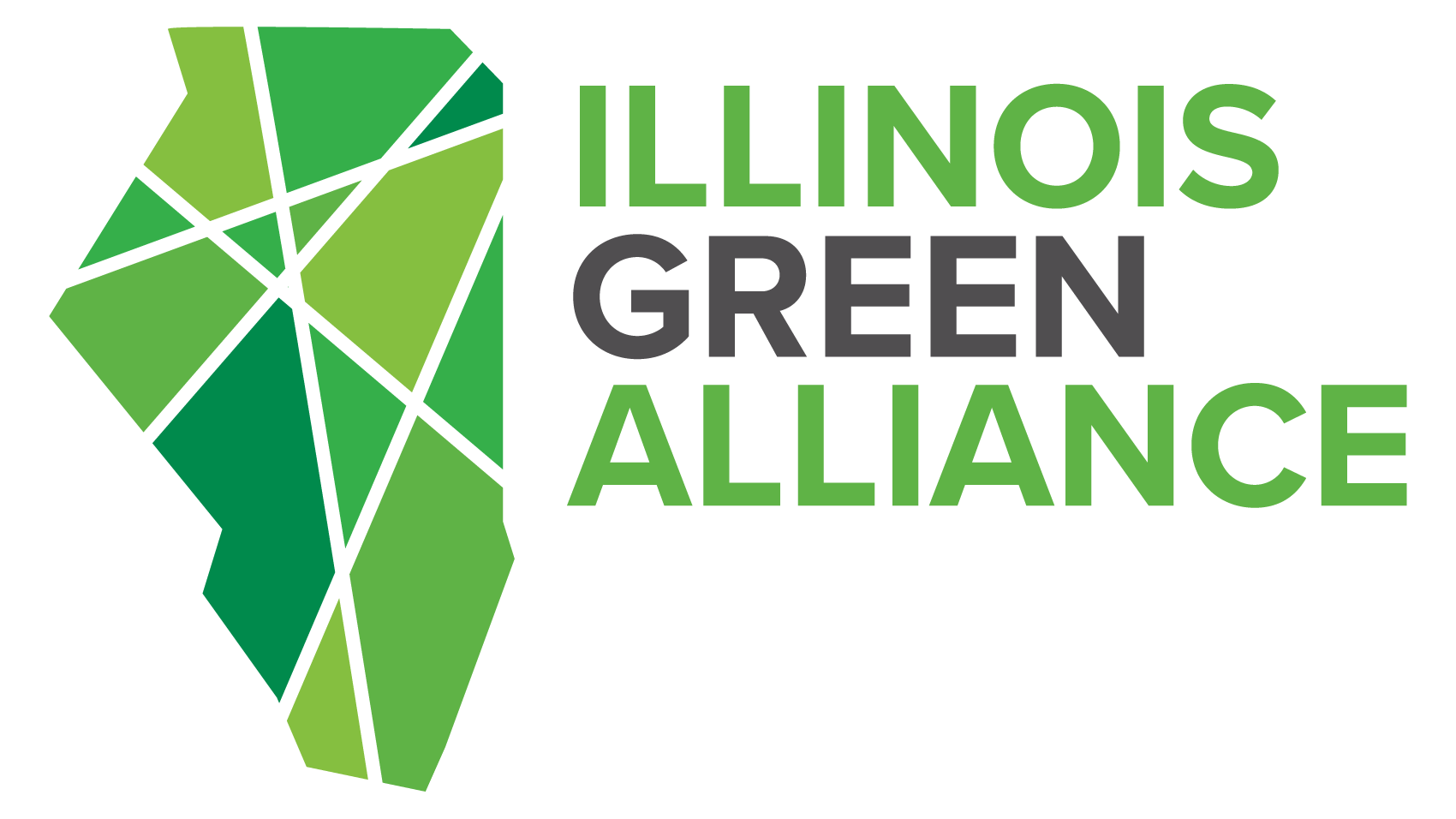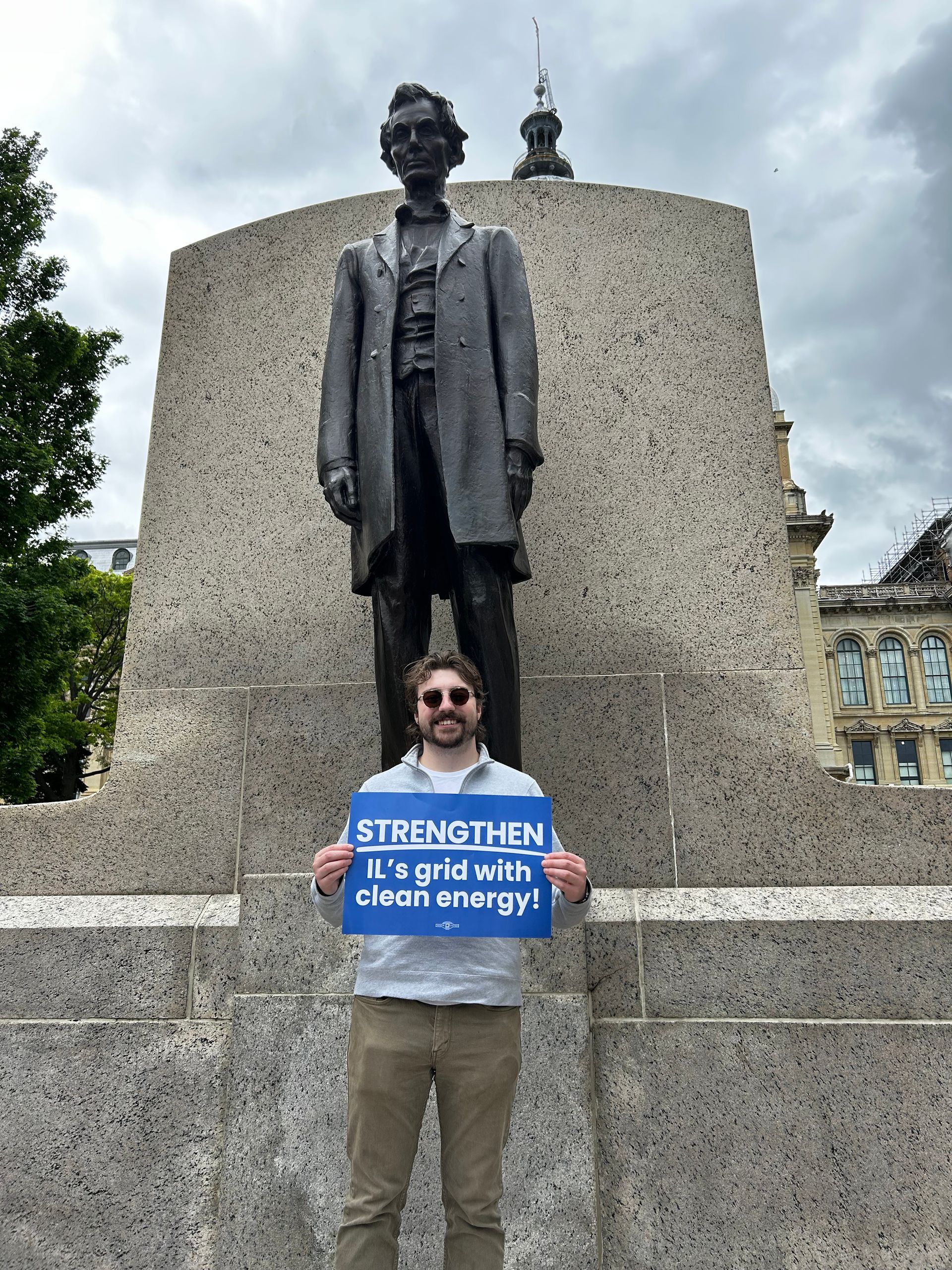Illinois Green Policy Update: May 2024
Illinois Clean Jobs Coalition Announces New Policy Platform
By Alejandra Rodriguez, Communications Intern
Earlier this month, the Illinois Clean Jobs Coalition (ICJC) released a platform to further state policy in the energy, building, and transportation sectors and build on the progress of the nation-leading Climate and Equitable Jobs Act (CEJA).
CEJA was established to reduce carbon emissions from the energy and transportation sectors. It includes provisions to phase out fossil fuels by eliminating emissions from non-public Electric Generating Units and Greenhouse Gas Emitting Units by 2045.
ICJC, an organization of hundreds of environmental advocacy organizations, businesses, community leaders, consumer advocates, environmental justice groups, and faith-based and student organizations, played a significant role in passing CEJA in 2021. The group works toward improving the environment, public health, protecting consumers, and creating more equitable and clean jobs across Illinois.
Of the policies introduced, the Clean and Healthy Buildings Act would phase out the burning of methane gas in homes and businesses, reducing costs, health hazards, and environmental degradation.
The proposal lowers gas bills by updating efficiency standards, requiring gas utilities to steadily reduce their emissions to reach zero by 2050, and requiring the Illinois Commerce Commission (ICC) to embed affordability in all ICC decision making for gas and electric utilities.
The Clean and Reliable Grid Act would accelerate the 100% clean renewable energy goal by reducing barriers to build transmission lines, updating energy efficiency policies, reducing consumer electricity demand, and requiring transparent energy planning from rural electric cooperatives and municipal utilities.
The final piece of the proposal is the Clean and Equitable Transportation Act, which aims to reduce the greenhouse gas impact of transportation across the state.
“We must reduce pollution in our buildings, and we must begin to manage the transition from dirty, expensive gas to more affordable clean energy solutions,” said Illinois State Senator Celina Villanueva. “We can do this right if we start doing this now.”
A New Federal Rule Could Bring a Renewable-Powered Electric Grid Closer to Reality.
While the cost of energy sources continues to drop and states like Illinois have committed to 100% carbon free power, connecting these new power sources to the grid continues to be a challenge.
Frequently, renewable energy projects are located in areas without infrastructure capable of transmitting energy to the electric grid or in areas without infrastructure at all. State and local governments and utilities frequently bicker about who covers the cost of transmission upgrades, which hinders work from moving forward. More factors in the complex grid equation are projections of growth in demand from more electric vehicles hitting the streets, intense summer heat driven by climate change, and trends toward building electrification.
Research suggests that nationwide the U.S. needs to add 4-7% in grid capacity annually; yet, only 1% is being added annually with the majority of these new projects focused on short-term reliability. In an attempt to narrow this gap, the Federal Energy Regulatory Commission (FERC), which regulates energy transmission, has taken several major steps through a rule passed earlier this month.
Order no. 1920 aims to transform transmission planning, permitting, and financing processes by requiring transmissions to plan for future energy needs. The rule requires regional providers to create 20-year plans for future energy needs and the facilities required to meet them. In this process, utilities will be required to justify large transmission investments based on long-term economics and overall cost savings, expand existing infrastructure capacity by reconductoring, and consider grid enhancing technologies.
Additionally, it creates a process for determining what organizations are responsible for infrastructure costs based on the benefits that they will receive from said projects.
This rule continues the momentum from a Federal Department of Energy rule change made last month which reduced hurdles that energy storage, transmission, and solar projects have to jump through during the review process.
If implemented to its full potential, FERC Order 1920 could have a massive effect that amplifies the impacts of other sustainability work. While electric vehicles and appliances are already cleaner than their fossil fuel counterparts, getting new renewable projects connected to the grid quicker will make the energy transition more appealing and beneficial.
More Green Building Highlights
Federal agencies could raise energy efficiency standards nationwide. Energy codes vary significantly state by state with many standards over 15 years old. In a move to bolster efficiency across the country, the Federal Department of Housing and Urban Development (HUD), Department of Agriculture (USDA), and Federal Housing Finance Agency (FHSA) have proposed raising their minimum standards from the 2009 IECC and ASHRAE 90.1-2007 to the much more efficient 2021 IECC and ASHRAE 90.1-2019.
If these rules are adopted, buildings receiving HUD & USDA financing or new homes with mortgages backed by Fannie Mae and Freddie Mac will be required to be built to the latest energy standards, regardless of their local building codes. While Illinois and five other states have already adopted IECC 2021 and wouldn’t be affected by the new rule, the other 44 states could see up to a 25% or more improvement in energy efficiency and life-cycle cost savings of up to $41,775 per home with an average payback time of two years.
These federal rules are not a replacement for state and local building codes, yet are projected to impact around two thirds of new construction for both market rate and low-income development, a substantial boon for more sustainable development.
As HUD, USDA, and FHSA consider this change, industry professionals are encouraged to share their thoughts with their Senators. Contact Erin Sherman at for more information.
Gas utility spending could triple rate-payer's charges over the next decade, according to a new report from the Building Decarbonization Coalition. The report found that the state’s gas utility companies have been spending over $1 billion annually on gas infrastructure, which could lead to an $80 billion-dollar stranded asset risk. Unchecked infrastructure spending could lead to monthly gas bills rising by $74 and $651 by 2050.
Provide your input on access to whole-building energy use data. Access to consumption data can help buildings improve performance and unlock funding opportunities. However, many utilities do not provide access to this data creating a barrier to improving sustainability. In a first step towards addressing this problem, the U.S. EPA is collecting input from people in the industry. Provide your comments here!
“You can’t manage what you don’t measure. When it comes to building data, benchmarking is the first step of any energy efficient or retrofit measure.” Illinois Green’s own Katie Kaluzny talked Energy Benchmarking and the future of these initiatives with Calico Energy. Energy Benchmarking requires owners and managers of large buildings to report their energy use and has been adopted by Chicago, Oak Park, and Evanston. Anyone interested in supporting Evanston as they implement their benchmarking ordinance can sign up for our Energy Benchmarking Data Jam on June 13.
In Other Sustainability News
- Illinois set to receive $240 million from Biden’s Bipartisan Infrastructure Act to identify, replace lead surface lines.
Read more - U.S. EPA - Learn how four Illinois cities are tackling climate change at the local level.
Watch here – NBC Chicago - President Biden announces high tariffs on Chinese solar panels, electric vehicles in push to bolster domestic production.
Read more - BBC - Over $1.6 Billion has been allocated for infrastructure, with a strong focus on sustainability, under the Biden Administration. What happens to this funding under a possible Trump presidency?
Read more – Politico - The Federal Department of Energy announces over 180,000 EV charging ports have been built nationwide since 2021.
Learn more – Joint Office of Energy and Transportation - House Republicans pass bill that would gut home appliance efficiency requirements.
Read more – MSNBC




